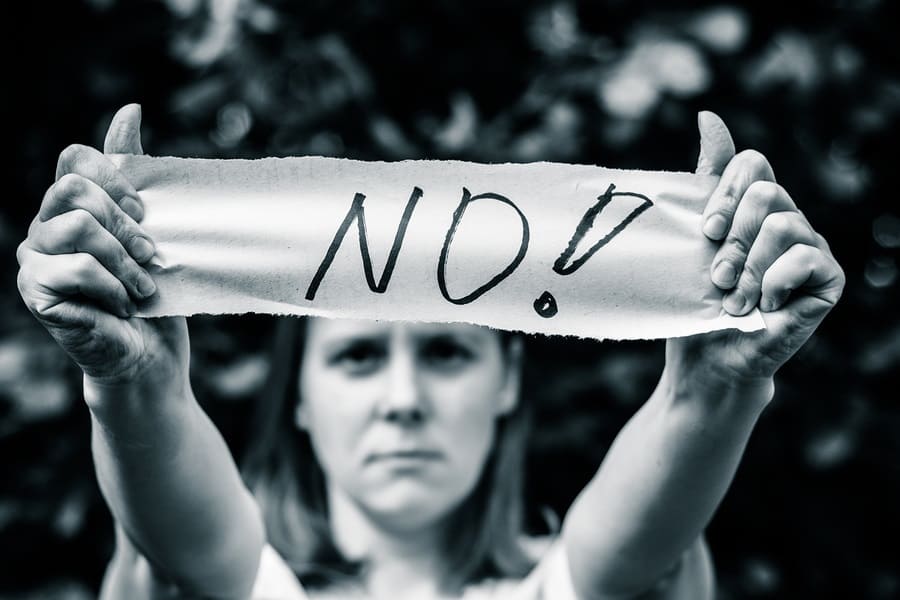April is Sexual Assault Awareness month, and as a parent to two small children I am plagued with how and when to begin sexual assault education and prevention in a meaningful way while my children are still so young. How does one teach kids about sexual assault awareness?
Sexual Assault this last year has been featured in headlines, splashed across tabloids, and debated on news stations. It’s been sung about at the Academy Awards and written about in major publications. It has been a topic of conversation for a variety of reasons, some of which involve high profile cases of alleged assaults. In spite of the increased conversations involving sexual assault and consent in the media, the fear of judgement and lingering stigmas are still huge barriers for victims to overcome.
Recently, my two-year-old daughter discovered the word “no” as a response to any and every request from her father and I. Though her use of the word “no” is not new, she has begun to exercise her right to use it at an alarmingly frequent rate and at increasingly powerful decibels. One day, while having “NO WAY” yelled in my face, although I wanted to permanently delete the word from my daughter’s vernacular, it occurred to me how powerful the word “no” can be.
Though it is contrary to the people-pleasing nature that is innate in many of us, the word “no” sets clear boundaries. Boundaries that I want my daughter and my son to be confident in setting for themselves as they grow older, go to school, and eventually move away from our ever-watchful eyes. When my children are out in the world on their own, I want the word “no” to flow as easily from their lips as it does when I tell them it’s time to turn the television off.
I want them to be comfortable saying “no” if they see a classmate being victimized on the playground.
I want them to be comfortable saying “no” if an adult is touching them in a way that makes them uncomfortable.
I want them to be comfortable saying “no” if a close friend wants them to try smoking for the first time.
I want them to be comfortable saying “no” if the popular group wants them to go along with the crowd.
I want them to be comfortable saying “no” if their boyfriend or girlfriend wants them to go further than they are ready to go.
I want them to be comfortable saying “no” even if they said “yes” five minutes earlier.
I want them to be comfortable saying “no” if they are offered a ride with a friend who has been drinking.
I want them to be comfortable saying “no” if a relationship is forcing them to be someone they are not.
I want them to be comfortable saying “no” if their superior isn’t treating them fairly.
I want them to be comfortable saying “no” if the disease-to-please is getting in the way of their own happiness.
I want them to be comfortable saying “no” if they are putting themselves last in life.
Teaching and encouraging my children to use the word “no” to set boundaries for themselves is a skill I believe to be as important as teaching and encouraging them to be compassionate and empathetic towards others. By learning to set boundaries for themselves, they are in fact learning to be compassionate and empathetic towards themselves as well. They are learning that hearing “no” is a boundary that others set for themselves too, and to respect that boundary. They are learning to listen to their hearts, to discern why they do not want to do something, and then to follow through. They are learning to be true to themselves. They are learning to trust themselves.
By learning to be comfortable with the word “no,” my children are learning to say “yes.”
“Yes” to healthy relationships.
“Yes” to being treated with respect.
“Yes” to respecting the boundaries of other people.
“Yes” to owning their own bodies.
“Yes” to prioritizing their personal safety.
“Yes” to their own happiness.
Having “NO WAY” yelled in my face by my daughter served to remind me that this is a toddler practicing setting boundaries in the only way that her two-year-old mind knows how to. This is the beginning of a teachable moment. She taught me a lot.
I believe that sexual assault education and prevention can start at home, even when our children are very young. By teaching about and encouraging healthy boundaries with our children, and through educating our kids about respecting the boundaries of others, we are taking steps toward the prevention of sexual assault.
Related
An Open Letter to Sexual Assault Victims
Stories from Victims of Sexual Assault
Thoughts on Victimization




